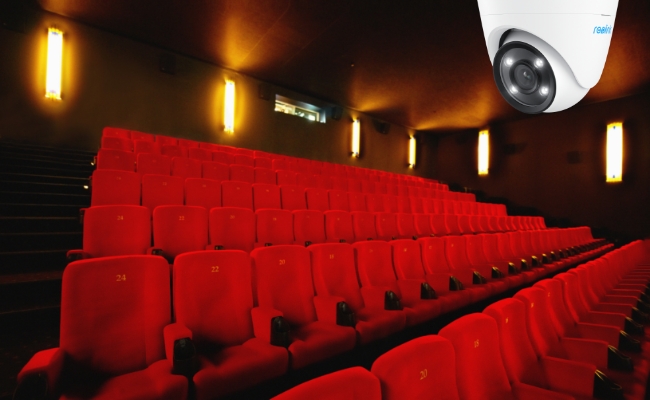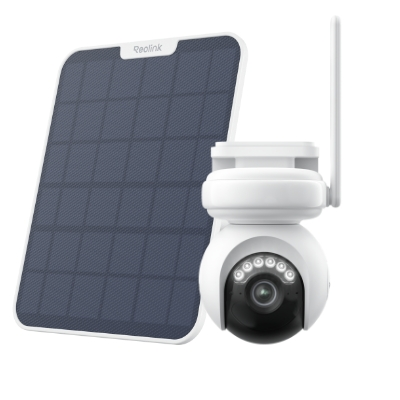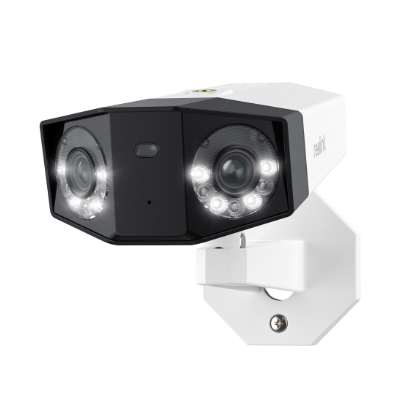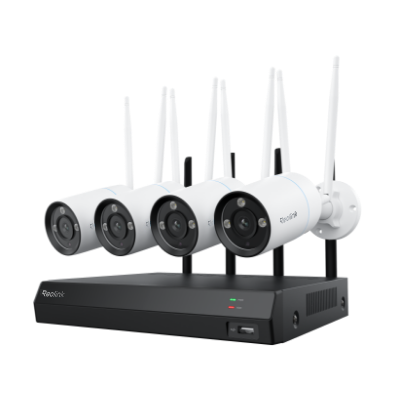Do Movie Theaters Have Cameras?

Many moviegoers wonder about : do movie theaters have cameras? The short answer is - yes, most movie theaters do have security cameras installed inside the auditoriums, hallways, and lobby areas.
Read on to understand the reasons for camera installation, what types of cameras are used, whether it's legal, and how to spot security cameras in your local cinema.
Why Do They Have Cameras in Movie Theaters?
Movie theaters install cameras for a variety of reasons - primarily for security and safety purposes. But why do movie theaters have cameras inside? Let's look at some of the main motivations behind camera usage in cinemas:
Deter Crime
Security cameras act as an effective deterrent against crimes like theft, vandalism, violence, etc. Their mere presence indicates criminals are being watched, which prevents them from targeting the premises. Stats show theaters with cameras report fewer instances of crime.
Prevent Piracy
Cameras inside auditoriums allow staff to monitor for illegal recording of the movie being played. Video recording in cinemas is strictly prohibited. But some miscreants try to film the movie on handy cams or mobile phones to distribute bootleg copies online or make pirated DVDs. The cameras catch such offenders red-handed.
Ensure Customer Safety
Monitoring customer movements on cameras allows theater personnel to watch out for fights, accidents, health emergencies, etc., so they can immediately intervene or arrange help. Cameras also help trace missing children via CCTV footage.
Manage Employees
Camera feeds are useful for remotely coordinating employees, directing task prioritization, and monitoring staff behavior with patrons. They are also able to capture evidence if employees are stealing, sleeping on duty, helping with piracy, etc.
Document Emergencies and Accidents
Video footage from security cameras serves as legal evidence if any incidents like injuries from falls, violence, fires, etc., occur on the premises. Some cameras are also installed to reduce insurance premiums or make claims easier during such events.
Do All Movie Theaters Have Cameras?
Most major movie theater chains like AMC, Regal Cinemas, Cinemark, etc., do have basic video surveillance systems installed - but their coverage may vary. For instance, lobby and hallway cameras may be more common than inside individual theaters. Smaller independent cinemas have more flexibility on cameras.
New multiplexes built in recent years are very likely to have more comprehensive camera systems watching lobbies, hallways, auditoriums, screens, exits, and entrances. Increased video analytics also enable detecting piracy.
Older cinema halls can lack proper security tech unless recently upgraded. Overall, most theaters do have some cameras, just not always inside viewing rooms.
Types of Cameras in Movie Theaters
Here are some of the most common varieties of security and surveillance cameras installed in movie halls and theaters:
Dome Cameras
Compact hemispheric dome cameras offer 360-degree coverage of rooms from ceilings and corners. The dome shape makes it hard to pinpoint the camera's line of sight. These are commonly seen in hallways and theater rooms.
Bullet Cameras
Bullet-style cameras are weatherproof for outdoor pointing at entry points. Their long shape also makes it easy to capture faraway lobby and hallway activity minus blind spots. Some models have built-in IR for night vision capability as well.
PTZ Cameras
PTZ (pan-tilt-zoom) cameras are high-end devices that can remotely pan, tilt, and zoom to track activity. Their versatility allows for monitoring wide auditoriums effectively. 4K sensors enable monitoring screens for piracy from back rows, too.
In addition, discrete spy cameras can hide near exits, tiny cameras within exit sign boards, etc. Many cameras nowadays can capture HD, night vision, or infrared vision footage for enhanced security monitoring.
Legality of Movie Theater Cameras
Do movie theaters have cameras in them and is it legal? The short answer is yes - video surveillance is perfectly legal in publicly accessible areas of a movie theater, i.e., lobby, hallways, ticket counters, food areas, entry gates, parking lots, external facades, and so on.
However, individual state laws need to be accounted for when placing cameras inside the actual theater/screening rooms where audiences sit. Putting signs indicating active CCTV cameras in operation is mandated. Privacy laws determine if back rows or seating areas inside rooms themselves can be monitored directly.
But film piracy deterrence laws do enable catching illegal camcorder use during screenings via long-range cameras.
Overall, video surveillance is legal in theaters, but room surveillance itself may fall into gray areas depending on the region. Checking local municipality regulations is advised before concluding do movie theaters have cameras in the rooms.
How to Tell If There Are Cameras in the Movie Theater
Wondering if your next movie outing venue might have cameras on the premises? Are there cameras in movie theaters? Look out for these telling signs:
Observe Visible Devices
Carefully examine corners of auditoriums, hall ceilings, and lobbies for small visible hemispheric dome cameras. Bullet cameras may be noticeable, pointing at exterior or hallway entries. Glancing at walls could reveal black glassy lenses or recording equipment, too.
Check Theater Policies
There may be notices, posters, or warnings indicating surveillance cameras are in operation at box office counters or building entrances. Websites and ticket purchase portals also tend to highlight security policies if cameras are actively utilized on their premises.
Ask Staff
Don't hesitate to ask personnel directly, like managers, ushers, or cleaners, about security cameras on site. However, understand that some surveillance may be kept confidential if installed - so absence is not fully confirmable by staff.
Pay Attention to Security Notices
Signboards explicitly warning patrons about CCTV cameras in use are a definite giveaway. You may spot stickers with "These premises are under video surveillance" or similar visual indicators that confirm cinema hall camera usage.
Camera Recommendations for Movie Theaters
Here, we’ve enlisted some camera models that can be used inside movie theaters.
Reolink Altas PT Ultra
Battery-powered security cameras are a great option for movie theaters, especially when reliable power outlets aren't available. The NEW Altas PT Ultra features a powerful 20,000 mAh battery, allowing it to record continuously throughout the entire movie.
Most importantly, it uses ColorX technology. The F1.0 large aperture and 1/1.8'' sensor bring 4 times the amount of light compared to traditional cameras and can provide color night vision comparable to daytime in dark environments without the need for additional spotlights.
Industry-leading 4K Continuous Recording Battery Camera
4K UHD Continuous Recording; ColorX Night Vision; Pan & Tilt; Automatic Tracking; All Recordings Stored Locally.
Reolink Duo 3 PoE
The innovative Reolink Duo 3 PoE delivers unprecedented 16MP ultra HD image quality and an extraordinarily wide 180° field of view. Featuring advanced dual lenses plus panoramic stitching, this WiFi and PoE camera captures every detail across an entire space with no blind spots.
With two 8MP 4K sensors, the Reolink Duo 3 produces a stunning 16MP resolution - over 4x higher than conventional 4MP cameras. The extraordinary image crispness lets you zoom in to see small objects clearly.
Groundbreaking 16MP Dual-Lens PoE Camera
16MP UHD, Dual-Lens, Motion Track, 180° Wide Viewing Angle, Power over Ethernet, Color Night Vision.
Reolink RLK12-800WB4
For large venues like movie theaters that require comprehensive video surveillance across multiple areas, the Reolink RLK12-800WB4 security camera system is an exceptional choice.
This kit contains a high-capacity 12-channel NVR able to connect 12 separate PoE cameras, plus 4 included ultra HD 4K 8MP WiFi cameras. The bundle delivers professional-grade HD monitoring to watch over every corner both indoors and outdoors.
The centralized 8MP NVR records sharp UHD footage from all connected cameras simultaneously. Its 12 channels allow expanding coverage with additional cameras as needed. It includes a 2TB HDD with capacity for over a week of 24/7 recording from maximum cameras.
4K Security Kit with Next-Gen WiFi 6
4 pcs 4K Ultra HD Security Cameras; Dual-Band WiFi 6; 2TB HDD 12-Channel NVR for 24/7 Recording; Peron/Vehicle/Animal Detection; IP67 Weatherproof.
FAQs
Do movie theaters have night vision cameras?
Yes, most modern movie theater surveillance systems do utilize cameras having built-in IR night vision capability. Enhanced low light recording is essential to monitor premises in the darkness after hours.
How do cinemas detect cameras?
Theaters use a mix of visual confirmation and video analytics to detect illegal usage of cameras in auditoriums. Long-range specialty cameras can identify handheld device shapes even in dark rooms. Smart software also checks for tiny lights from external camera lenses.
Are movie theater cameras monitored?
In large chains, all cameras may be actively viewed from a central security room for real-time threat response. Smaller halls have local recordings that are checked in case of incidents. Certain cameras run automated analyses to only notify anomalies via alerts. Critical areas mostly have live oversight.
Conclusion
Do movie theaters have cameras? It's clear that a majority of movie theaters do have well-equipped camera surveillance - right from brands like AMC and Regal Cinemas down to small-town community halls. Reasons like security, piracy prevention, and insurance necessitate indoor cameras.
Do share your thoughts and experiences about encountering cameras at your local movie halls or multiplexes. Feel free to also discuss this ubiquitous aspect of the cinema landscape.
Search
Be in the Know
Security insights & offers right into your inbox



